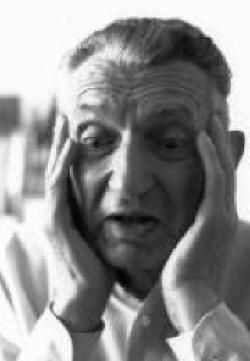

 Paul Gerhard Vogel
(1915 – December 13, 2014) was initially imprisoned for five years for refusing to be a Hitler Youth flag-bearer. Paul Gerhard Vogel was arrested in 1943 on charges of homosexuality.
Paul Gerhard Vogel
(1915 – December 13, 2014) was initially imprisoned for five years for refusing to be a Hitler Youth flag-bearer. Paul Gerhard Vogel was arrested in 1943 on charges of homosexuality.
Friedrich-Paul von Groszheim was dragged from his bed by the Gestapo. He was arrested in the port of Lubeck with with 230 other suspected homosexuals in 1937. "They beat us to a pulp," he recalled. "I couldn't lie down ... my whole back [was] bloody. You were beaten until you finally named names." He was eventually offered the Nazi "alternative" of castration or concentration camp. He chose castration, a decision which probably saved his life.
Paul Gerhard Vogel, who was also arrested on charges of homosexuality, was not given that option. Sentenced to seven years in Emsland penal camp, he was made to work up to 15 hours a day, seven days a week. "For half a year, I was kept bent over," he says. "My hands were tied to my ankles." He was forced to go to the toilet in his pants, and to lick food from the floor. Several of the guards sexually abused and beat the homosexual prisoners.
Vogel was later transferred to Nazi-occupied Norway to work in freezing conditions, clearing snow in the far north. He was given shoes made of wood, paper and wire. To keep warm he had to stuff three layers of newspapers under his clothes. Miraculously, he survived the war.
These two were among about 100,000 gay men arrested in Germany and Austria between 1933 and 1945. Some 50,000 were jailed, mostly in regular prisons, while up to about 15,000 were sent to concentration camps. It is not known how many of them died but one scholar believes 60 per cent - 9,000 - could have perished. Gay men - few lesbians are believed to have been arrested or persecuted - were a target of Nazi wrath in their attempt to "purify" society and propagate a master-race.
Soon after he took office in 1933 Hitler banned all homosexual and lesbian organisations. Brown-shirted storm troopers raided homosexual institutions and the numerous gay bars and cafes that had flourished in the relative freedom of the 1920s, particularly in Berlin, Hamburg, Munich and Bremen.
In 1934 a special Gestapo division on homosexuals was set up. One of its first acts was to compile "pink lists" of suspected homosexual men; such lists had been kept by police since 1900.
In 1935 Paragraph 175 of the Criminal Code, dealing with homosexuals, was tightened to penalise a broader range of "lewd and lascivious" acts between men; the need to provide overriding proof of homosexual conduct was removed. Spurred on by Heinrich Himmler, head of the SS, police stepped up raids on gay meeting places. Assisted by informers, arrests spiralled. Accusations of homosexuality were also used against suspected political opponents of the Nazis. Once imprisoned and convicted of homosexuality the inmates, who were known as "175ers" and often had a pink triangular patch, known as a "Rosa Winkel", sown to their jackets, often endured savage treatment by prison guards. Some homosexuals were victims of medical experiments, including castration. Operations to "convert" men to heterosexuality by inserting hormone capsules were carried out, sometimes with fatal results.
In spite of their sufferings, most homosexual concentration-camp prisoners were not acknowledged as victims of Nazi persecution after the war and compensation was refused. Under the Allied military government of Germany, some gay men were forced to serve out jail sentence regardless of time spent in concentration camps, although that period is deducted from their pension entitlement. Rule 175 remained in effect in West Germany until 1969 and in 1957 the Supreme Court ruled that homosexuals arrested by the Nazis were common criminals and therefore legitimately incarcerated.
Gay-rights groups are now clamouring for the German government to acknowledge the past atrocities, pay compensation and establish a monument to remember the Nazis' homosexual victims at a planned Holocaust memorial next to the Brandenburg Gate in Berlin. They are angry that most of the plethora of books about the Holocaust have ignored the plight of homosexuals and at the failure of the authorities to prosecute any of the Nazi doctors who carried out experiments on gays. A homosexual umbrella organisation is also lobbying officials in Switzerland for inclusion of gays in the new pounds 50m fund to aid victims of the Holocaust. The OutRage! gay-rights group has written to Chancellor Helmut Kohl of Germany asking for an official apology to the gay community, payment of compensation similar to that awarded to Jewish survivors, and better pensions.
A spokeswoman for the Germany embassy in London said: "The whole discussion has started again and we have been asked for compensation but at present there's no special provision for homosexuals." Tomorrow OutRage! has organised a Queer Remembrance Day ceremony at the Cenotaph in London for homosexuals who died during the Second World War. Peter Tatchell, of OutRage!, said: "It's time the German government apologised for the Nazi persecution of homosexuals and paid compensation to gay Holocaust survivors. "The story of the gay Holocaust has been suppressed by most historians and most people are unaware of the atrocities that were carried out."
The story of gay Holocaust survivors is being shown in a film, We Were Marked With a Big A.
My published books: